The Reusable Transport Packs Market is estimated to be valued at USD 119.8 billion in 2025 and is projected to reach USD 210.5 billion by 2035, registering a compound annual growth rate (CAGR) of 5.8% over the forecast period.
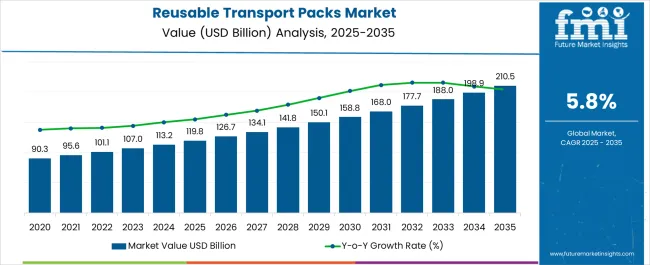
| Metric | Value |
|---|---|
| Reusable Transport Packs Market Estimated Value in (2025 E) | USD 119.8 billion |
| Reusable Transport Packs Market Forecast Value in (2035 F) | USD 210.5 billion |
| Forecast CAGR (2025 to 2035) | 5.8% |
The Reusable Transport Packs market is experiencing strong growth, driven by increasing demand for sustainable packaging and logistics solutions across various industries. Growing environmental awareness and regulations restricting single-use packaging have encouraged manufacturers and distributors to adopt reusable packs that reduce waste and lower operational costs. Advanced materials, innovative designs, and durability improvements have enhanced the efficiency and lifespan of transport packs, making them suitable for repeated handling and transport.
The market is further supported by the expansion of the food and beverage, retail, and pharmaceutical sectors, where safe, reliable, and hygienic transport of goods is critical. Integration with supply chain management systems and warehouse automation has improved tracking, handling, and inventory efficiency. Increasing focus on sustainability, cost reduction, and operational optimization is encouraging organizations to shift toward reusable solutions.
Continuous innovation in lightweight, durable, and customizable packs is expected to sustain market growth As industries continue to prioritize efficiency, environmental responsibility, and regulatory compliance, the market is poised for long-term expansion, driven by technological advancements and increased adoption of eco-friendly logistics practices.
The reusable transport packs market is segmented by material type, product type, end use, and geographic regions. By material type, reusable transport packs market is divided into Plastic, Polypropylene (PE), Polyethylene Terephthalate (PET), Polyethylene (PE), High Density Polyethylene (HDPE), Low Density Polyethylene (LDPE), Wooden, Metal, and Others.
In terms of product type, reusable transport packs market is classified into Pallet, Crates, Intermediate Bulk Containers (IBCs), Boxes, Drums, Totes, and Others. Based on end use, reusable transport packs market is segmented into Food & Beverage Industry, Pharmaceuticals Industry, Agriculture Industry, Constructions Industry, Automotive Industry, and Others.
Regionally, the reusable transport packs industry is classified into North America, Latin America, Western Europe, Eastern Europe, Balkan & Baltic Countries, Russia & Belarus, Central Asia, East Asia, South Asia & Pacific, and the Middle East & Africa.
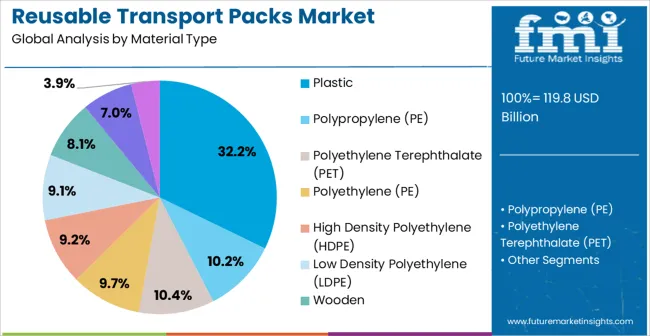
The plastic material type segment is projected to hold 32.2% of the market revenue in 2025, establishing it as the leading material category. Growth in this segment is being driven by the durability, lightweight nature, and cost-effectiveness of plastic, which enables repeated use without significant degradation. Plastic packs offer resistance to moisture, chemicals, and physical stress, making them suitable for diverse logistics applications.
The ability to manufacture them in standardized sizes and integrate with automated handling systems further supports operational efficiency. Plastic packs can be easily cleaned, sanitized, and customized for specific goods, providing high versatility across industries. Environmental regulations promoting reusable solutions combined with innovations in recyclable and sustainable plastics have strengthened adoption.
Organizations are increasingly leveraging plastic packs to reduce overall packaging waste, optimize storage, and improve supply chain efficiency As demand for reliable, durable, and reusable transport solutions rises, the plastic material type segment is expected to maintain its leadership, driven by performance advantages, cost efficiency, and adaptability to various logistical needs.
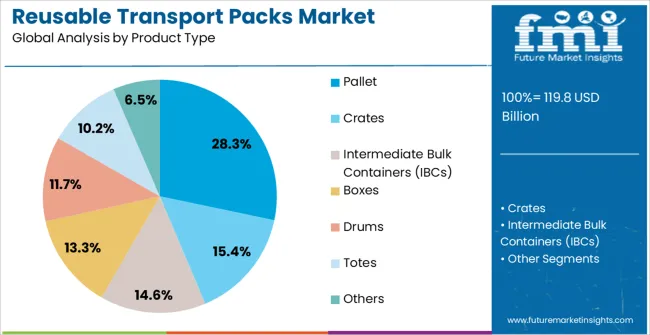
The pallet product type segment is expected to account for 28.3% of the market revenue in 2025, making it the leading product category. Pallets are being increasingly adopted due to their ability to streamline handling, storage, and transport operations across supply chains. Reusable pallets enhance operational efficiency by supporting heavy loads, reducing handling time, and minimizing product damage.
Compatibility with automated warehouse and material handling systems further accelerates adoption. Customization in size, weight capacity, and stackability allows integration into diverse logistics networks, particularly in food and beverage, retail, and industrial applications. The durability and extended lifecycle of reusable pallets provide cost savings compared with single-use alternatives.
Environmental regulations and sustainability initiatives are further driving demand, as companies seek to reduce waste and carbon footprint Ongoing innovation in lightweight, strong, and hygienic pallet designs is strengthening the segment’s market position As industries increasingly prioritize efficiency, cost reduction, and eco-friendly practices, the pallet segment is expected to maintain its leading share in the reusable transport packs market.
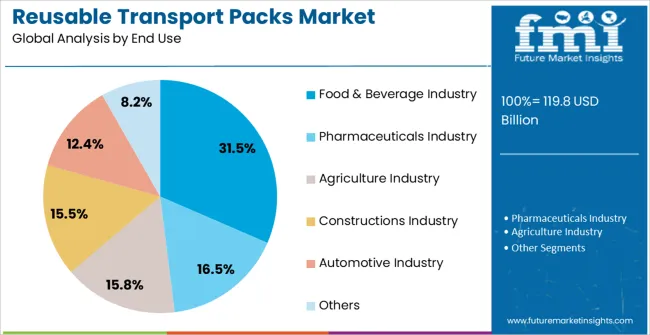
The food and beverage industry end-use segment is projected to hold 31.5% of the market revenue in 2025, establishing it as the leading end-use category. Growth in this segment is being driven by the need to transport perishable goods safely, hygienically, and efficiently across production, processing, and retail environments. Reusable transport packs provide contamination resistance, ease of cleaning, and durability, ensuring compliance with stringent food safety and regulatory standards.
Integration with cold chain logistics, automated handling systems, and inventory management platforms further supports operational efficiency. Companies are leveraging reusable packs to reduce packaging waste, minimize damage to goods, and achieve cost savings over time. Increasing consumer awareness of sustainability and environmentally responsible practices is reinforcing adoption.
Continuous innovation in materials, design, and modularity is enabling food and beverage producers to optimize logistics while meeting regulatory and sustainability requirements As supply chain efficiency, product safety, and environmental considerations remain key priorities, the food and beverage segment is expected to maintain its leading revenue share in the market.
Manufacturers of consumer products as well as industrial products are looking towards recyclable and reusable packaging solution. Reusable transport packs employ the concept of returning the packaging material to the original starting point so that the packaging product can be used again and again. This is reverse logistics concept, while there are chances of involvement of third company that records and supplies the reusable transport packs to the destination.
Shipping of the products is majorly done in pallets, IBCs, totes, carts, tubs, tanks, boxes and other handling packaging products, that are costlier. However, reusable transport packs reduce the cost involved in the manufacturing of the new secondary packaging products.
The reusable transport packs are clean and sterile, therefore they are widely preferred by the food packaging manufacturers. Reusable transport pack is widely used for food and beverage industry, pharmaceuticals industry, agriculture industry, construction industry, automotive industry and others.
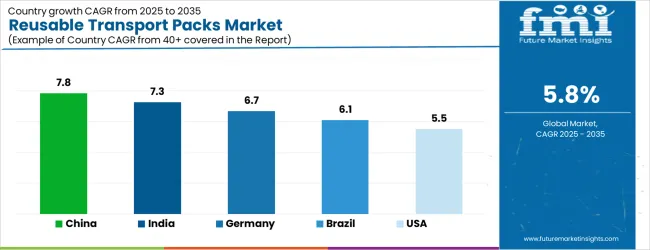
| Country | CAGR |
|---|---|
| China | 7.8% |
| India | 7.3% |
| Germany | 6.7% |
| Brazil | 6.1% |
| USA | 5.5% |
| UK | 4.9% |
| Japan | 4.4% |
The Reusable Transport Packs Market is expected to register a CAGR of 5.8% during the forecast period, exhibiting varied country level momentum. China leads with the highest CAGR of 7.8%, followed by India at 7.3%. Developed markets such as Germany, France, and the UK continue to expand steadily, while the USA is likely to grow at consistent rates.
Japan posts the lowest CAGR at 4.4%, yet still underscores a broadly positive trajectory for the global Reusable Transport Packs Market. In 2024, Germany held a dominant revenue in the Western Europe market and is expected to grow with a CAGR of 6.7%.
The USA Reusable Transport Packs Market is estimated to be valued at USD 41.5 billion in 2025 and is anticipated to reach a valuation of USD 41.5 billion by 2035. Sales are projected to rise at a CAGR of 0.0% over the forecast period between 2025 and 2035. While Japan and South Korea markets are estimated to be valued at USD 6.5 billion and USD 3.0 billion respectively in 2025.
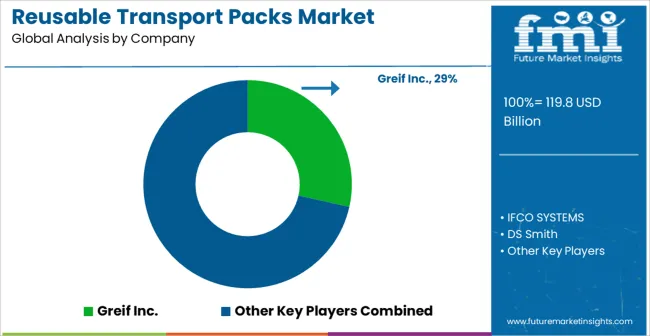
| Item | Value |
|---|---|
| Quantitative Units | USD 119.8 Billion |
| Material Type | Plastic, Polypropylene (PE), Polyethylene Terephthalate (PET), Polyethylene (PE), High Density Polyethylene (HDPE), Low Density Polyethylene (LDPE), Wooden, Metal, and Others |
| Product Type | Pallet, Crates, Intermediate Bulk Containers (IBCs), Boxes, Drums, Totes, and Others |
| End Use | Food & Beverage Industry, Pharmaceuticals Industry, Agriculture Industry, Constructions Industry, Automotive Industry, and Others |
| Regions Covered | North America, Europe, Asia-Pacific, Latin America, Middle East & Africa |
| Country Covered | United States, Canada, Germany, France, United Kingdom, China, Japan, India, Brazil, South Africa |
| Key Companies Profiled | Greif Inc., IFCO SYSTEMS, DS Smith, Mauser Packaging Solutions, and Borealis AG |
The global reusable transport packs market is estimated to be valued at USD 119.8 billion in 2025.
The market size for the reusable transport packs market is projected to reach USD 210.5 billion by 2035.
The reusable transport packs market is expected to grow at a 5.8% CAGR between 2025 and 2035.
The key product types in reusable transport packs market are plastic, polypropylene (pe), polyethylene terephthalate (pet), polyethylene (pe), high density polyethylene (hdpe), low density polyethylene (ldpe), wooden, metal and others.
In terms of product type, pallet segment to command 28.3% share in the reusable transport packs market in 2025.






Our Research Products

The "Full Research Suite" delivers actionable market intel, deep dives on markets or technologies, so clients act faster, cut risk, and unlock growth.

The Leaderboard benchmarks and ranks top vendors, classifying them as Established Leaders, Leading Challengers, or Disruptors & Challengers.

Locates where complements amplify value and substitutes erode it, forecasting net impact by horizon

We deliver granular, decision-grade intel: market sizing, 5-year forecasts, pricing, adoption, usage, revenue, and operational KPIs—plus competitor tracking, regulation, and value chains—across 60 countries broadly.

Spot the shifts before they hit your P&L. We track inflection points, adoption curves, pricing moves, and ecosystem plays to show where demand is heading, why it is changing, and what to do next across high-growth markets and disruptive tech

Real-time reads of user behavior. We track shifting priorities, perceptions of today’s and next-gen services, and provider experience, then pace how fast tech moves from trial to adoption, blending buyer, consumer, and channel inputs with social signals (#WhySwitch, #UX).

Partner with our analyst team to build a custom report designed around your business priorities. From analysing market trends to assessing competitors or crafting bespoke datasets, we tailor insights to your needs.
Supplier Intelligence
Discovery & Profiling
Capacity & Footprint
Performance & Risk
Compliance & Governance
Commercial Readiness
Who Supplies Whom
Scorecards & Shortlists
Playbooks & Docs
Category Intelligence
Definition & Scope
Demand & Use Cases
Cost Drivers
Market Structure
Supply Chain Map
Trade & Policy
Operating Norms
Deliverables
Buyer Intelligence
Account Basics
Spend & Scope
Procurement Model
Vendor Requirements
Terms & Policies
Entry Strategy
Pain Points & Triggers
Outputs
Pricing Analysis
Benchmarks
Trends
Should-Cost
Indexation
Landed Cost
Commercial Terms
Deliverables
Brand Analysis
Positioning & Value Prop
Share & Presence
Customer Evidence
Go-to-Market
Digital & Reputation
Compliance & Trust
KPIs & Gaps
Outputs
Full Research Suite comprises of:
Market outlook & trends analysis
Interviews & case studies
Strategic recommendations
Vendor profiles & capabilities analysis
5-year forecasts
8 regions and 60+ country-level data splits
Market segment data splits
12 months of continuous data updates
DELIVERED AS:
PDF EXCEL ONLINE
Reusable Water Bottle Market Forecast and Outlook 2025 to 2035
Reusable Box Market Forecast and Outlook 2025 to 2035
Reusable Crate Welding Lines Market Size and Share Forecast Outlook 2025 to 2035
Reusable Oil Absorbents Market Size and Share Forecast Outlook 2025 to 2035
Transport Cases & Boxes Market Size and Share Forecast Outlook 2025 to 2035
Transportation and Security System Market Size and Share Forecast Outlook 2025 to 2035
Reusable Grocery Tote Market Analysis - Size and Share Forecast Outlook 2025 to 2035
Transport Management System Market Size and Share Forecast Outlook 2025 to 2035
Transportation Biofuel Market Size and Share Forecast Outlook 2025 to 2035
Transportation Infrastructure Construction Market Size and Share Forecast Outlook 2025 to 2035
Transportation Aggregators Market Size and Share Forecast Outlook 2025 to 2035
Transport Fuel Cell Market Size and Share Forecast Outlook 2025 to 2035
Reusable Period Panties Market Analysis - Size, Share, and Forecast Outlook 2025 to 2035
Reusable Tumblers Market Size and Share Forecast Outlook 2025 to 2035
Reusable Laparoscopic Instruments Market is segmented by Reusable Laparoscopic Scissors and Reusable Hand Instruments from 2025 to 2035
Reusable Incontinence Products Market Analysis - Size, Share & Forecast 2025 to 2035
Reusable Nursing Pads Market Size and Share Forecast Outlook 2025 to 2035
Transportation Based Hydrogen Energy Storage Market Size and Share Forecast Outlook 2025 to 2035
Reusable Cold Chain Packaging Market Size and Share Forecast Outlook 2025 to 2035
Reusable Wine Bags Market Size and Share Forecast Outlook 2025 to 2035

Thank you!
You will receive an email from our Business Development Manager. Please be sure to check your SPAM/JUNK folder too.
Chat With
MaRIA